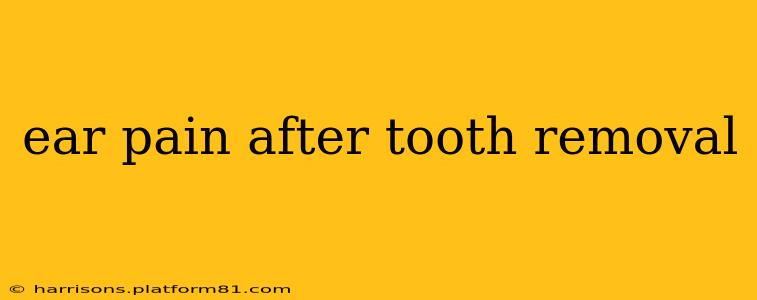Experiencing ear pain after a tooth extraction is more common than you might think. While it might seem unrelated, the proximity of teeth to the ear and the intricate network of nerves and tissues in the jaw can easily lead to referred pain. Understanding the causes, prevention strategies, and effective treatments is crucial for managing this discomfort. This comprehensive guide will delve into the various aspects of ear pain following tooth extraction, providing you with the knowledge to navigate this experience effectively.
Why Does My Ear Hurt After a Tooth Extraction?
The connection between your teeth and your ears might not be immediately obvious, but their close proximity within the jawbone plays a significant role. Several factors can contribute to ear pain after tooth removal:
-
Referred Pain: This is the most common cause. Nerves in the jaw and surrounding areas can be stimulated during the extraction process, sending pain signals that are perceived as originating from the ear. The brain often misinterprets the location of the pain.
-
Infection: Although less common with modern dental practices, an infection at the extraction site can cause inflammation that spreads, resulting in ear pain. Signs of infection include increased pain, swelling, redness, and pus.
-
Sinus Infection (Rare): In some cases, particularly with upper molar extractions, the procedure might affect the sinuses, leading to a sinus infection which can manifest as ear pain.
-
Dry Socket (Alveolar Osteitis): While primarily characterized by intense pain at the extraction site, a dry socket can sometimes cause referred pain to the ear. This occurs when the blood clot protecting the socket is dislodged.
-
Temporomandibular Joint (TMJ) Dysfunction: Although not directly caused by the extraction itself, the procedure can exacerbate pre-existing TMJ issues, leading to jaw pain that can radiate to the ear.
What Should I Do If I Have Ear Pain After Tooth Extraction?
If you're experiencing ear pain after a tooth extraction, here's what you should do:
-
Contact your dentist or oral surgeon immediately: Don't hesitate to seek professional advice. They can assess the situation and provide appropriate treatment.
-
Follow post-operative instructions carefully: This includes avoiding strenuous activity, rinsing your mouth gently, and taking prescribed medication as directed.
-
Apply a cold compress: Applying ice packs to the affected area can help reduce swelling and pain.
-
Rest: Adequate rest is vital for healing.
-
Over-the-counter pain relievers: Pain relievers like ibuprofen or acetaminophen can help manage the pain, but always follow the recommended dosage and consult your dentist if you have concerns.
How Can I Prevent Ear Pain After Tooth Extraction?
While you can't always prevent referred pain, adhering to these steps can minimize your risk:
-
Choose an experienced oral surgeon or dentist: A skilled professional minimizes trauma during the extraction, reducing the likelihood of complications.
-
Follow all pre- and post-operative instructions: This includes any medications or dietary restrictions your dentist recommends.
-
Maintain good oral hygiene: A healthy mouth is less susceptible to infections.
-
Manage existing TMJ disorders: Addressing pre-existing TMJ issues before the extraction can help reduce the risk of complications.
Is Ear Pain After Tooth Extraction Normal?
Some degree of discomfort, including mild ear pain, is considered normal immediately following a tooth extraction. However, severe or persistent ear pain should be addressed promptly by a dental professional. It's crucial to distinguish between mild, transient discomfort and symptoms requiring medical attention.
How Long Does Ear Pain After Tooth Extraction Last?
The duration of ear pain varies depending on the individual and the cause. In most cases, mild ear pain related to referred pain should subside within a few days. Persistent or worsening pain indicates a potential complication requiring dental attention.
When Should I See a Doctor About Ear Pain After a Tooth Extraction?
Seek immediate medical attention if your ear pain is severe, accompanied by fever, swelling, redness, pus, or if the pain worsens rather than improves. Don't delay seeking professional help if you suspect an infection or other complication.
This information is for general knowledge and does not constitute medical advice. Always consult with your dentist or a qualified healthcare professional for any concerns regarding your oral health. Remember, prompt attention to potential complications can significantly impact your recovery and overall well-being.
